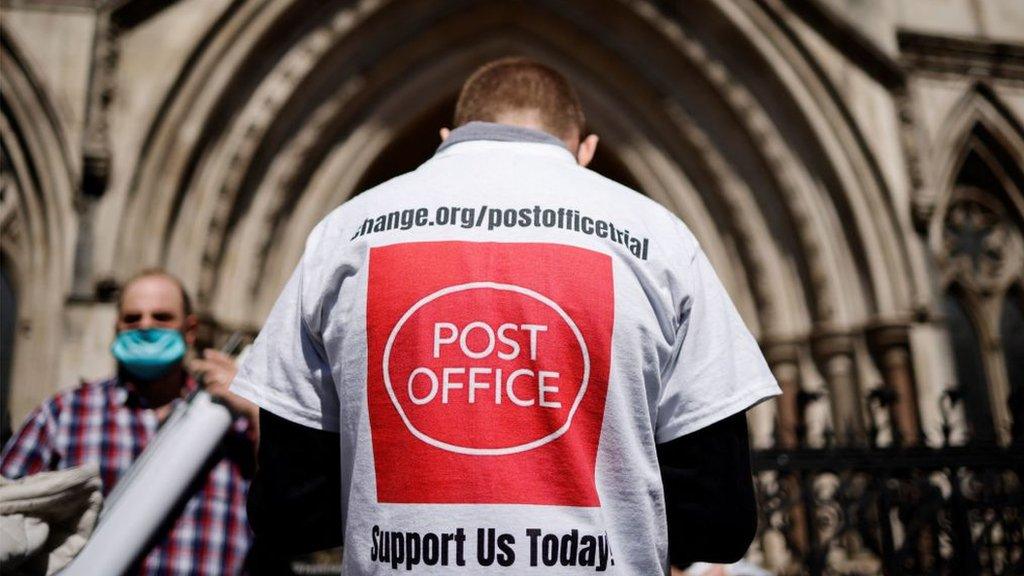Post Office scandal: 'I want someone else to be charged and jailed like I was'
- Published

Harjinder Butoy's conviction was finally overturned after he spent years in prison.
Harjinder Butoy says he still hears the echoes of the prison cell door slamming behind him after he was imprisoned for a crime he did not commit.
"I always say, I got three years three months, but it feels like I got a 14-year jail sentence, because I had to clear my name," he explains.
Mr Butoy and his wife ran the post office in the Nottinghamshire market town of Sutton-in-Ashfield for five years. They invested time and money to turn the business around and did not suspect anything was wrong when auditors turned up to check on the accounts. They had been through an audit the week before with no problems.
But Mr Butoy was arrested, charged and sent to jail for stealing £208,000.
It took until last year to get that conviction overturned in the High Court. But he doesn't feel like his ordeal is over yet.
"People say you've had your name cleared you're all right now. But it's not, you want justice," he tells BBC News. "I want someone else to be charged and jailed like I was."
This year, he should at least get some of his questions answered.
On Monday, 14 February, the public inquiry into the wrongful of conviction of 706 Post Office branch managers, like Mr Butoy, will begin to hear evidence. Those convictions are the most widespread miscarriage of justice in British legal history, and are now gradually being overturned in the courts.
Thousands of others lost huge sums of money as they tried to make up mysterious shortfalls at their branches, which the Post Office is only now beginning to refund.
The inquiry is expected to run for the rest of this year and will address why sub-postmasters were singled out and whether they have been justly compensated.
Crucially, it will ask whether those at software developer Fujitsu, the Post Office itself or even their biggest shareholder, the government, knew about faults in the system while using that data in court to convict sub-postmasters.
Horizon software was introduced into the Post Office network from 1999. The system, developed by the Japanese company Fujitsu, was used for tasks such as transactions, accounting and stocktaking.
But problems with Horizon were well known at the time.
From his first week in the job, Mr Butoy noticed that the Horizon accounting software was not adding up properly. "I was £500 short," he explained, even though a supervisor had been with him the entire time, making sure he got to grips in his new role. "I didn't think anything of it. But ever since then, it happened a lot."

Jez Thompson worked on Fujitsu's Horizon Training Project which covered 60,000 Post Office branches
What Mr Butoy noticed, was seen not only by other Post Office branch managers, but also by those who knew the new software inside out.
One such expert, Jez Thompson, worked as a team leader for Fujitsu's Horizon Training Project, covering 60,000 Post Office branches over five years from the late 1990s.
In many respects, it is a role he remembers with great fondness. "There were 400 of us, travelling all over the UK, up into little villages or the mountains, by the coast, working with some really fine people," he says.
"At the time we were really proud of what we were doing."
He remembers the meticulous arithmetic skill of the Post Office staff he trained, as well as their loyalty to the business and respect within their communities. But he also remembers regular glitches and bugs that made the software fail to calculate the books accurately.
"Occasionally it would work, but a lot of the time it wouldn't work," he says.

A public inquiry into the wrongful conviction of 706 Post Office branches will hear evidence
Mr Thompson and his team were training staff on a version of Horizon they were told perfectly mirrored the one that was live in Post Office branches across the country.
"Anything that was wrong with our system would be wrong on the live system as well," he explains. "And we used to, on a monthly, probably even a weekly basis, pass information up to our managers just informing them that we'd found a glitch and this doesn't work. That's just the way it went."
Mr Thompson acknowledges that all software applications have bugs. No system is perfect and updates are needed. But he worries, in hindsight, that the rollout was rushed before Horizon was ready.
"I reported them [these issues] to my line manager and he then reported that to a weekly meeting with Fujitsu Training Services, where both Fujitsu and The Post Office would have been present and glitches would've been discussed," he says.
"Computers have reels of data. Somewhere there is evidence that somebody knew something."
The Post Office says that it is "sincerely sorry" for the impact of the Horizon scandal, adding they are "in no doubt about the human cost."
"The inquiry's hearings enable many of those who were most deeply affected by Post Office's past failings to voice their experiences and their testimonies must and will ensure all lessons are learned so that such events can never happen again," a spokesperson added. "In addressing the past, our first priority is that full, fair and final compensation is provided and we are making good progress."

In April 2021 judges quashed the convictions of 39 former postmasters
The government has set aside funding to facilitate compensation payments.
"We understand the serious impact that faults with the Horizon IT system and the Post Office's management of the resulting issues have had on affected postmasters and their families - with many losing their livelihoods or being wrongly convicted for crimes they didn't commit," Postal Affairs Minister Paul Scully MP said.
"That's why we have set up a statutory inquiry to set out exactly what went wrong and to ensure something like this never happens again, as well as providing financial support for compensation."
A spokesperson Fujitsu said they are cooperating with the Inquiry. "The inquiry is examining complex events stretching back over 20 years," they added. "Fujitsu is committed to providing the fullest and most transparent information so that key lessons are learned for the future."
Related topics
- Published23 April 2021

- Published22 July 2021

- Published23 April 2021

- Published14 May 2021

- Published21 June 2021

